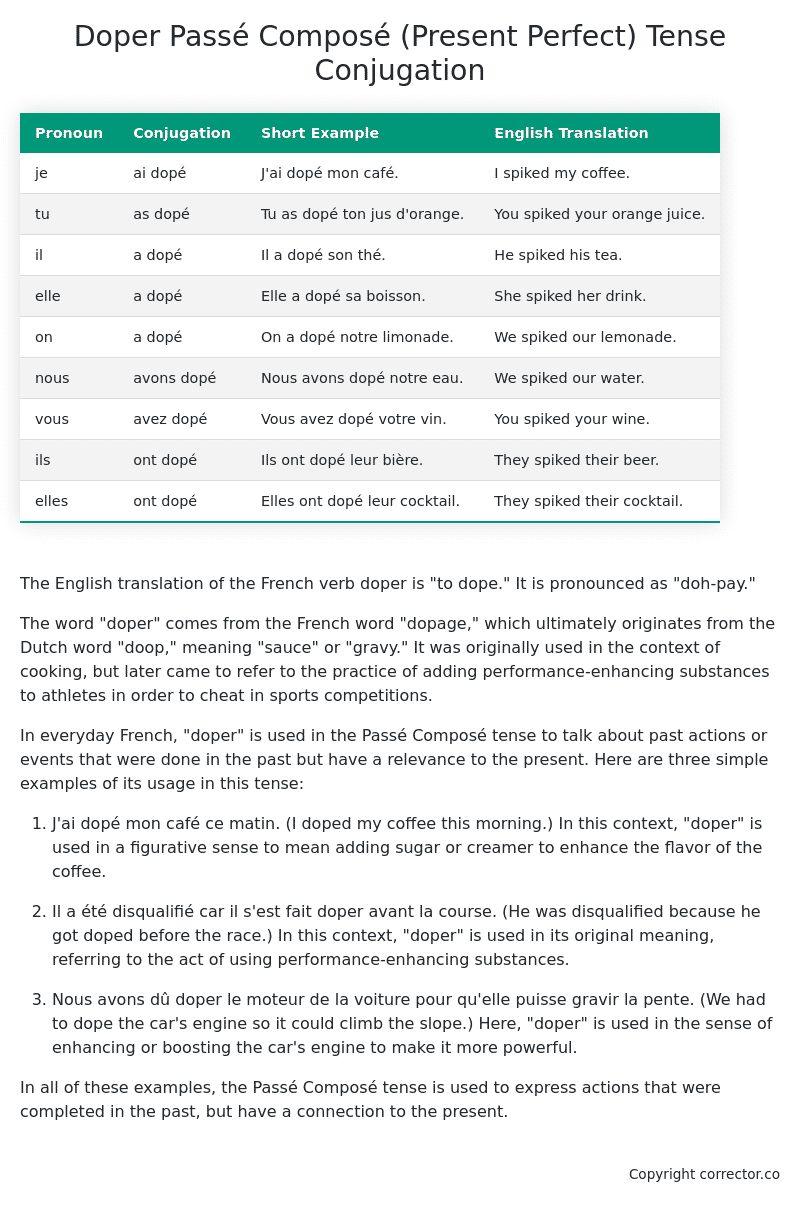Passé Composé (Present Perfect) Tense Conjugation of the French Verb doper
Introduction to the verb doper
The English translation of the French verb doper is “to dope.” It is pronounced as “doh-pay.”
The word “doper” comes from the French word “dopage,” which ultimately originates from the Dutch word “doop,” meaning “sauce” or “gravy.” It was originally used in the context of cooking, but later came to refer to the practice of adding performance-enhancing substances to athletes in order to cheat in sports competitions.
In everyday French, “doper” is used in the Passé Composé tense to talk about past actions or events that were done in the past but have a relevance to the present. Here are three simple examples of its usage in this tense:
-
J’ai dopé mon café ce matin. (I doped my coffee this morning.) In this context, “doper” is used in a figurative sense to mean adding sugar or creamer to enhance the flavor of the coffee.
-
Il a été disqualifié car il s’est fait doper avant la course. (He was disqualified because he got doped before the race.) In this context, “doper” is used in its original meaning, referring to the act of using performance-enhancing substances.
-
Nous avons dû doper le moteur de la voiture pour qu’elle puisse gravir la pente. (We had to dope the car’s engine so it could climb the slope.) Here, “doper” is used in the sense of enhancing or boosting the car’s engine to make it more powerful.
In all of these examples, the Passé Composé tense is used to express actions that were completed in the past, but have a connection to the present.
Table of the Passé Composé (Present Perfect) Tense Conjugation of doper
| Pronoun | Conjugation | Short Example | English Translation |
|---|---|---|---|
| je | ai dopé | J’ai dopé mon café. | I spiked my coffee. |
| tu | as dopé | Tu as dopé ton jus d’orange. | You spiked your orange juice. |
| il | a dopé | Il a dopé son thé. | He spiked his tea. |
| elle | a dopé | Elle a dopé sa boisson. | She spiked her drink. |
| on | a dopé | On a dopé notre limonade. | We spiked our lemonade. |
| nous | avons dopé | Nous avons dopé notre eau. | We spiked our water. |
| vous | avez dopé | Vous avez dopé votre vin. | You spiked your wine. |
| ils | ont dopé | Ils ont dopé leur bière. | They spiked their beer. |
| elles | ont dopé | Elles ont dopé leur cocktail. | They spiked their cocktail. |
Other Conjugations for Doper.
Le Present (Present Tense) Conjugation of the French Verb doper
Imparfait (Imperfect) Tense Conjugation of the French Verb doper
Passé Simple (Simple Past) Tense Conjugation of the French Verb doper
Passé Composé (Present Perfect) Tense Conjugation of the French Verb doper (this article)
Futur Simple (Simple Future) Tense Conjugation of the French Verb doper
Futur Proche (Near Future) Tense Conjugation of the French Verb doper
Plus-que-parfait (Pluperfect) Tense Conjugation of the French Verb doper
Passé Antérieur (Past Anterior) Tense Conjugation of the French Verb doper
Futur Antérieur (Future Anterior) Tense Conjugation of the French Verb doper
Subjonctif Présent (Subjunctive Present) Tense Conjugation of the French Verb doper
Subjonctif Passé (Subjunctive Past) Tense Conjugation of the French Verb doper
Subjonctif Imparfait (Subjunctive Imperfect) Tense Conjugation of the French Verb doper
Subjonctif Plus-que-parfait (Subjunctive Pluperfect) Tense Conjugation of the French Verb doper
Conditionnel Présent (Conditional Present) Tense Conjugation of the French Verb doper
Conditionnel Passé (Conditional Past) Tense Conjugation of the French Verb doper
L’impératif Présent (Imperative Present) Tense Conjugation of the French Verb doper
L’infinitif Présent (Infinitive Present) Tense Conjugation of the French Verb doper
Struggling with French verbs or the language in general? Why not use our free French Grammar Checker – no registration required!
Get a FREE Download Study Sheet of this Conjugation 🔥
Simply right click the image below, click “save image” and get your free reference for the doper present perfect tense conjugation!

Doper – About the French Passé Composé (Present Perfect) Tense
Formation of the Passé Composé
Set the auxiliary verb with either
Conjugate the auxiliary verb
Add the past participle
Common everyday usage patterns
Narrating Past Events
Sequential Actions
Describing Completed Actions
Interactions with other tenses
Imperfect Tense
Conditional and Future Tenses
Summary
I hope you enjoyed this article on the verb doper. Still in a learning mood? Check out another TOTALLY random French verb conjugation!


